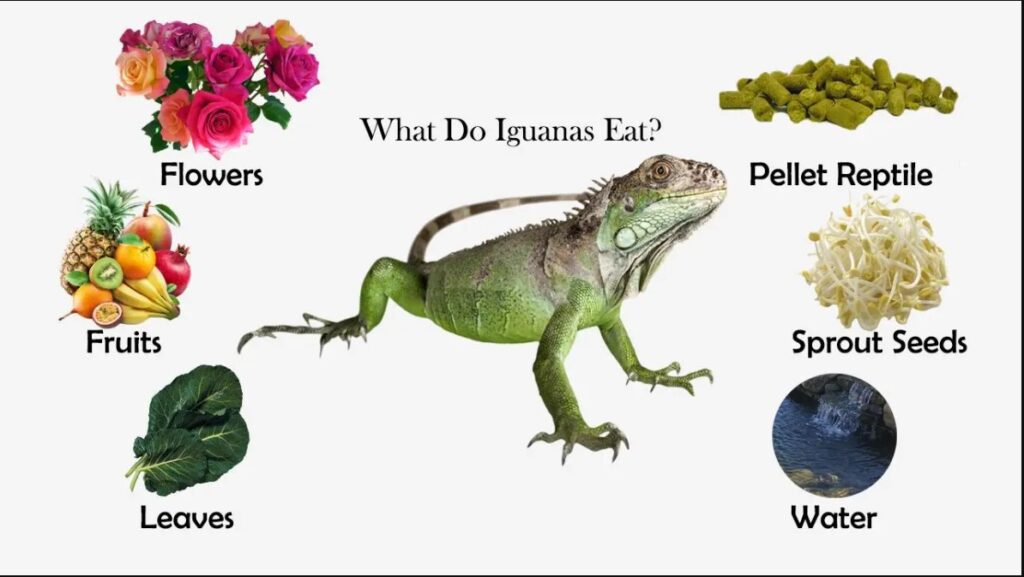Green iguanas, scientifically known as Iguana iguana, are herbivorous reptiles native to Central and South America. Their diet plays a crucial role in their overall health and well-being. Understanding what green iguanas eat is essential for their proper care and nutrition. In this article, we will explore the various aspects of the green iguana diet, including their preferred foods, essential nutrients, foods to avoid, feeding guidelines, and hydration needs.
Essential Foods for the Green Iguana Diet

Preferred Live Food Options
- Leafy greens: Green iguanas have a strong preference for leafy greens such as collard greens, mustard greens, and dandelion greens. These provide important vitamins and minerals.
- Fresh herbs: Herbs like basil, cilantro, and parsley can be added to their diet to enhance flavor and provide additional nutrients.
- Edible flowers: Flowers such as hibiscus, nasturtiums, and roses can be offered occasionally as a treat.
- Vegetables: Certain vegetables like bell peppers, squash, and carrots can be included in their diet for variety and nutritional balance.
Safe Vegetables for Regular Intake
- Dark leafy greens: Spinach, kale, and Swiss chard are excellent sources of calcium and should be included regularly in the green iguana’s diet.
- Cruciferous vegetables: Broccoli, cauliflower, and Brussels sprouts are rich in fiber and provide essential vitamins.
- Squash and zucchini: These vegetables are hydrating and contain valuable nutrients such as vitamin A and potassium.
- Carrots and sweet potatoes: These root vegetables offer a good source of beta-carotene and can be given in moderation.
Recommended Fruits for the Green Iguana Diet
- Papaya: This tropical fruit is high in vitamin C and aids digestion.
- Mango: Rich in vitamins A and E, mangoes make a nutritious addition to the diet.
- Berries: Strawberries, blueberries, and raspberries are rich in antioxidants and can be offered as occasional treats.
- Melons: Watermelon, cantaloupe, and honeydew melon are hydrating and provide essential hydration during hot weather.
Essential Vitamins & Minerals
Certain vitamins and minerals are crucial for the green iguana’s overall health:
- Calcium: Green iguanas require a calcium supplement to maintain proper bone and shell development. It is recommended to dust their food with a calcium powder specifically formulated for reptiles.
- Vitamin D3: This vitamin aids in the absorption of calcium and can be obtained through exposure to UVB lighting or specific reptile supplements.
- Beta-carotene: Found in vegetables and fruits, beta-carotene is converted into vitamin A, which supports eye health and immune function.
- Omega-3 fatty acids: These healthy fats can be provided through flaxseed oil or other reptile-safe sources to promote skin and coat health.
Foods to Avoid for Green Iguanas
It is important to avoid certain foods that can be harmful or toxic to green iguanas:
- Animal protein: Green iguanas are herbivores and should not be fed any form of animal protein, including insects, meat, or dairy products.
- Toxic plants: Ensure that the food offered does not contain any toxic plants such as avocado, rhubarb leaves, or lilies, as these can be poisonous to green iguanas.
- High-oxalate greens: Spinach and beet greens, although nutritious, should be given sparingly due to their high oxalate content, which can interfere with calcium absorption.
Feeding Guidelines for Green Iguana Owners
To ensure proper nutrition and feeding habits for your green iguana, consider the following guidelines:
- Age-specific diet: Young green iguanas require a higher proportion of protein-rich foods compared to adult iguanas. As they grow older, their diet should transition to include more leafy greens and vegetables.
- Balanced ratios: The ideal ratio for the green iguana diet is approximately 80% leafy greens and vegetables, and 20% fruits.
- Variety is key: Offer a diverse range of foods to provide essential nutrients and prevent boredom.
- Freshness and cleanliness: Make sure all food items are fresh, washed thoroughly, and pesticide-free.
- Feeding frequency: Adult green iguanas should be fed once daily, while juveniles may require two to three feedings per day.
Understanding Green Iguana Hydration Needs
Green iguanas rely on both food moisture and external water sources to stay properly hydrated. Consider the following hydration tips:
- Water bowl: Provide a shallow water bowl that is easily accessible for drinking and occasional soaking.
- Mist or spray: Mist the enclosure daily to create a humid environment and encourage drinking.- Fresh greens: Offer fresh, moistened greens such as romaine lettuce or collard greens, which provide hydration alongside nutrition.
- Bathing: Green iguanas can benefit from regular baths to promote hydration and maintain healthy skin. Fill a shallow basin with lukewarm water and allow your iguana to soak for 10-15 minutes, ensuring their safety throughout the process.
It’s important to monitor your green iguana’s hydration levels by observing their behavior and evaluating their droppings. If you notice signs of dehydration such as sunken eyes, wrinkled skin, or dry stools, consult a veterinarian promptly.
Conclusion
In conclusion, understanding the green iguana diet is crucial for their overall health and well-being. Providing a balanced and varied diet consisting of leafy greens, vegetables, and occasional fruits is essential to meet their nutritional needs. Remember to avoid toxic foods and be mindful of the hydration requirements through water bowls, misting, and bathing. By following these guidelines, you can ensure that your green iguana thrives and enjoys a long and healthy life.
FAQs About Green Iguana Diet
What do green iguanas eat in the wild?
Green iguanas in the wild primarily consume a variety of plant-based foods. Their diet includes leaves, flowers, fruits, and some vegetables. This herbivorous diet provides them with the necessary nutrients to thrive in their natural habitat.
Can green iguanas eat insects or meat?
While green iguanas are primarily herbivores, young iguanas might consume insects or small amounts of animal matter. However, as they grow older, it’s important to transition them to a plant-based diet to ensure their health and well-being.
What should I feed my pet green iguana?
Pet green iguanas require a balanced diet consisting of leafy greens, vegetables like bell peppers, squash, and carrots, and occasional fruits like berries or melon. Calcium supplements and proper UVB lighting are crucial to their overall health.
How often should I feed my green iguana?
Adult green iguanas should be fed daily, while younger ones may require multiple feedings a day. It’s important to avoid overfeeding to prevent obesity and related health issues. A consistent feeding schedule contributes to their overall vitality.
Can I feed my iguana spinach and lettuce?
While spinach and lettuce can be offered occasionally, they should not be the main components of an iguana’s diet. High oxalate levels in spinach and limited nutritional value in iceberg lettuce make them less suitable for regular consumption.
What are the signs of a poor diet in green iguanas?
Signs of an inadequate diet include weight loss, lethargy, muscle weakness, metabolic bone disease, and stunted growth. A properly balanced diet rich in essential nutrients is crucial to prevent these health issues in green iguanas.
Can green iguanas eat fruits, and if so, which ones?
Yes, green iguanas can eat fruits in moderation. Suitable options include berries, melon, mango, and papaya. However, due to their higher sugar content, these should be considered treats rather than staple foods.
How do I transition my iguana to a new diet?
Transition your iguana to a new diet gradually. Introduce new foods while still offering familiar ones to help them adapt. This approach ensures they continue to receive essential nutrients and minimizes any potential disruptions to their digestive system.
Is it necessary to provide water to iguanas?
Yes, it is crucial to provide clean, fresh water to iguanas at all times. A shallow dish of water that they can easily access should be available in their enclosure. Proper hydration supports their overall health and well-being.



